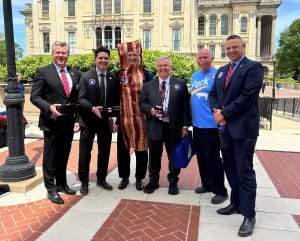House passes FY '22 ag appropriations bill
Legislative Watch: House Ag approves $8.5 billion disaster aid bill; Bill would end corn ethanol mandate; Trade Promotion Authority (TPA) expires.

This week, the House passed a mini-bus appropriations bill that includes $196.7 billion in funding for USDA for FY '22. The bill increases funds for rural broadband, climate-related programs, nutrition, and research. USDA's discretionary programs are funded at $26.55 billion, an increase of more than 10% above 2021.
During House consideration of the bill, amendments were adopted that would provide an additional $5.3 million to increase field staff for USDA's Natural Resources and Conservation Service, make more communities eligible for USDA's rural broadband grants and loans, and increase staffing for USDA Rural Development by $2 million.
The bill includes:
Rural Broadband - provides $907 million which is an increase of $165 million for the expansion of broadband service. This includes $800 million for the USDA's ReConnect grant and loan program.
Food Safety and Inspection Service (FSIS) - provides $1.153 billion for FSIS. The funding will maintain more than 8,700 inspection personnel for meat, poultry, and egg products that cover over 6,500 facilities.
Farm Programs - $1.873 billion is provided for farm programs, which is an increase of $48.5 million over FY '21.
Agricultural Research - $3.324 billion, an increase of $226.5 million, is for agriculture research programs, including the Agriculture Research Service (ARS) and the National Institute for Food and Agriculture (NIFA).
Women, Infants, and Childen (WIC) - provides $6 billion in discretionary funding for WIC. It includes $834 million to increase the amounts of fruits and vegetables in the WIC Food Package. It is estimated that 6.4 million women, infants, and children will participate in the WIC program in FY '22.
Supplemental Nutrition Assistance Program (SNAP) - provides $105.792 billion in mandatory funding for SNAP. It is estimated that 45 million people will use SNAP during FY '22.
Child Nutrition Programs - $26.9 billion is provided for child nutrition programs (school lunch, school breakfast, Summer EBT, etc.), an increase of $1.774 billion over last fiscal year.
The bill would revoke line speed waivers that were issued during the COVID-19 public health emergency. This will affect 16 poultry waivers issued during the Trump administration.
It also prohibits companies owned by the People's Republic of China from purchasing U.S. farmland and participating in USDA programs.
House Ag approves $8.5 billion disaster aid bill
The House Agriculture Committee approved the reauthorization of Wildfire and Hurricane Indemnity Program Plus (WHIP+) with added coverage for weather events, crop and agricultural product losses. The bill will also make it easier for producers to qualify. The $8.5 billion bill would cover losses for 2020 and 2021.
The legislation will cover losses from drought, high winds, excessive heat, and polar vortexes, as well as weather causing power outages. Grapes damaged by smoke will be covered. It will allow direct payments to dairy and sugar cooperatives.
Producers will qualify for drought loss, with a D2 drought designation for the county, instead of the current D3 or D4 designation for an area.
The legislation was supported by the American Farm Bureau Federation, National Farmers Union, National Cotton Council, National Milk Producers Federation, and National Sorghum Producers.
Bill would end corn ethanol mandate
The Corn Ethanol Mandate Elimination Act would end the corn ethanol mandate in the Renewable Fuel Standard (RFS), which requires annual increases in the amount of renewable fuel blended into the total volume of gasoline refined in the U.S.
Senate sponsors Pat Toomey, R-Pa., Dianne Feinstein, D-Calif., Susan Collins, R-Maine, and Bob Menendez, D-N.J., said the bill would reduce carbon emissions by removing the corn ethanol requirement while leaving in place the requirements for advanced and cellulosic biofuels and biodiesel.
Toomey said: "The federal government forcing Americans to buy billions of gallons of corn ethanol is terrible policy on many levels. For starters, it imposes financial harm on consumers and refineries, risking thousands of good-paying jobs. Further, the RFS drives up the cost of gas and food, harms our environment, and damages engines. I hope my colleagues will join us in our bipartisan effort to end this backwards policy.”
The National Corn Growers Association (NCGA) strongly opposes the bill. NCGA President John Linder stated, "This bill is ill conceived and would have a devastating impact on air quality, the diversity of our energy supply, fuel prices and rural economies. Blending ethanol into the fuel supply is one of the most effective ways to lower carbon emissions to combat climate change and replace the most toxic components of gasoline."
According to NCGA, the Department of Energy’s Argonne National Laboratory GREET model shows ethanol’s carbon intensity is 44-52% lower than gasoline’s carbon intensity, and Argonne has found that the carbon intensity of corn-based ethanol has declined 23% since 2005.
The Advanced Biofuels Business Council said in opposition to the legislation, "This proposal does nothing for advanced biofuels, and we do not appreciate being used to greenwash a top priority for a handful of the dirtiest oil refineries in the country."
Trade Promotion Authority (TPA) expires
Trade Promotion Authority (TPA) expired on July 1. Without any indication when Congress or the administration will seek renewal, U.S. competitors continue to move forward on new trade agreements.
TPA allows Congress to consider trade agreements on an expedited time frame with a guaranteed up-or-down vote.
Sources: P. Scott Shearer, who is solely responsible for the information provided, and wholly own the information. Informa Business Media and all its subsidiaries are not responsible for any of the content contained in this information asset.
About the Author(s)
You May Also Like


